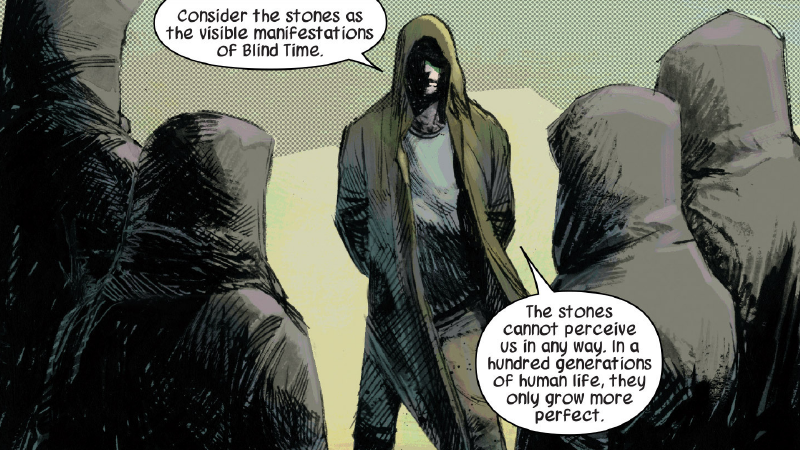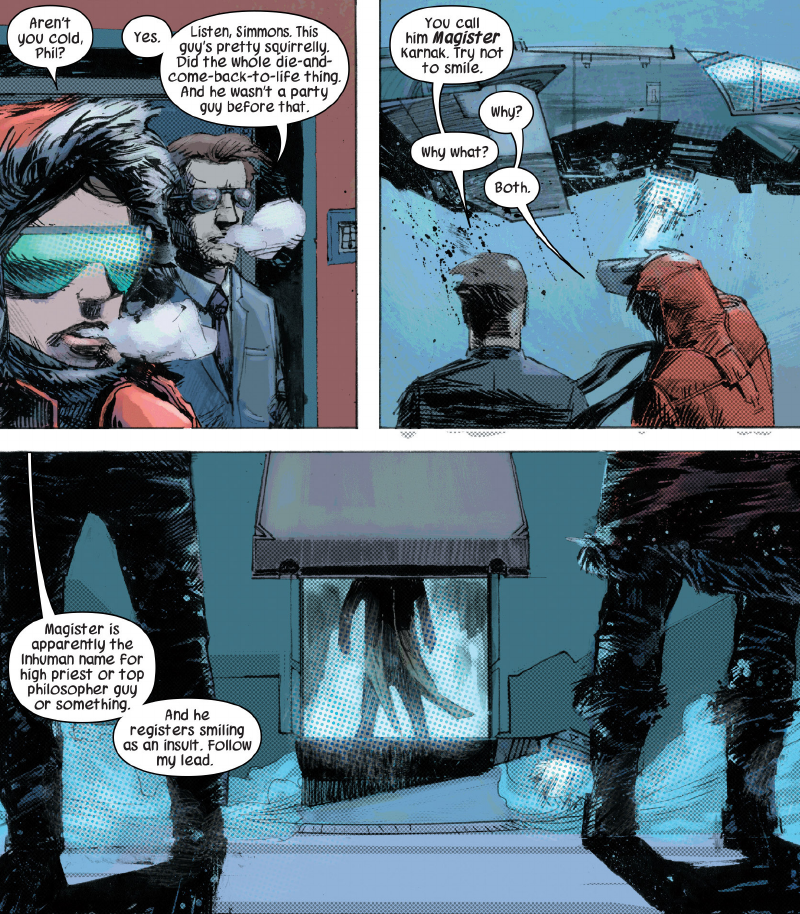Image may be NSFW.
Clik here to view.
This week, Marvel’s big push for the Inhumans
Spoilers ahead, for both Uncanny Inhumans #1 and Karnak #1.
http://io9.com/can-marvel-mak...
Both of the Inhumans comics out this week attempt to reflect the alien nature of Inhumanity, its relationship with Humankind, and its newfound prominence in the Marvel comics universe—Terrigen mist, the gaseous substance that “unlocks” the Inhuman DNA dormant in people, has spread across the world, leading to a massive uptake in recently-awoken Inhumans. But the Terrigen mist is also poisoning Mutants
Image may be NSFW.
Clik here to view.
This is reflected mainly in Uncanny Inhumans #1, from Charles Soule and Jay Leisten, which attempts to lay out the groundwork for two Inhuman stories—the more minor of the two sees Inhuman King Black Bolt, Triton, and Reader traveling through time looking for Black Bolt’s lost son. They also come across the classic Marvel villain Kang the Conqueror, who Black Bolt made a deal with to keep his son safe during the cataclysm of Secret Wars.
It’s clearly set up for a bigger conflict with team Inhuman later, but here, it just gets in the way of an actually interesting story: The Inhumans, lead by Medusa (Black Bolt’s wife), trying to integrate themselves better into human society. Just like the mutants before them, Inhumans had a rough time with being accepted by Humankind—even more so now in a world where they’re suddenly cropping up everywhere and also accidentally poisoning Mutants. Their old ways of isolation are no longer feasible, so Medusa tries to build bridges between both Human and Mutant.
Image may be NSFW.
Clik here to view.
Her team of Inhuman heroes comes from all around the world, they have their “press faces” ready to go after a fight. Later on in the issue, she even discusses potential appearances on CNN or The Daily Show (she takes Daily Show, of course)—and is shown working with Hank McCoy on a potential treatment for why Terrigen is killing and sterilizing Mutants. She is, as she says, sick of death. She realizes that Inhumans can no longer keep to themselves—to survive, they have to integrate. Save the day. Make public appearances. Make people believe that they are the same as them.
Karnak, written by Warren Ellis and with art from Gerardo Zaffino, on the other hand, goes in the completely opposite direction—and it’s a lot more compelling.
Image may be NSFW.
Clik here to view.
Unlike the Inhumans with Medusa in New Attilan, Karnak is still alone and isolated. He makes a certain point of pride in being alien, in that by being Inhuman, he is inherently different from the Humans around him—and to Karnak, a man whose greatest power is to target and exploit the flaw in everything he sees, that makes him better.
For all of Medusa’s talk of integration, Karnak demands acknowledgement of his difference around him, even when confronting a similar situation to the Uncanny teams. When called upon by SHIELD to investigate the disappearance of a recently awoken Inhuman, he demands to be called Magister, or that people around him know how to react (in Karnak’s case, that’s don’t smile at him).
Image may be NSFW.
Clik here to view.
While Medusa soft-talks the media, Karnak is brusque and uncaring about anything that isn’t Inhuman. When confronted with the grieving family of the missing boy, he offers help, but only in exchange for an impossible item—the single item that allows these two parents to believe in a happy universe. He doesn’t care how much that would hurt them. He demands it because he’s Karnak, and quite frankly doesn’t care what anyone thinks of him.
Said attitude applies just as much to Karnak’s foes as it does his allies—so when he discovers a double agent in SHIELD’s midst (what it with that place and double agents, seriously?) he’s got no qualms of doing anything to get the job done. As long as he can do it by being a badass. Remember how I said Karnak can see the flaw in everything? That includes bullets, so he can slice them in half with a single swipe. And other peoples internal organs... which he can do unpleasant things to.
Image may be NSFW.
Clik here to view.
Did I mention Karnak does all this in front of the Parents he just humiliated? Karnak represents everything that the Inhumans are trying to placate in Uncanny Inhumans. He’s alien. He’s not like you or me. And he’s incredibly powerful, and incredibly dangerous. And unlike Medusa, he doesn’t care a single iota about that difference. He embraces it. It’s amazing to see such two radically different approaches to a similar theme in these two series, but it goes to show the range of stories we can get out of this Inhuman resurgence.
It’s just that, in a world where Marvel is pushing in a big way to get us care about the Inhumans, a comic dedicated to one that decidedly doesn’t care about what we think of him is incredibly fascinating.